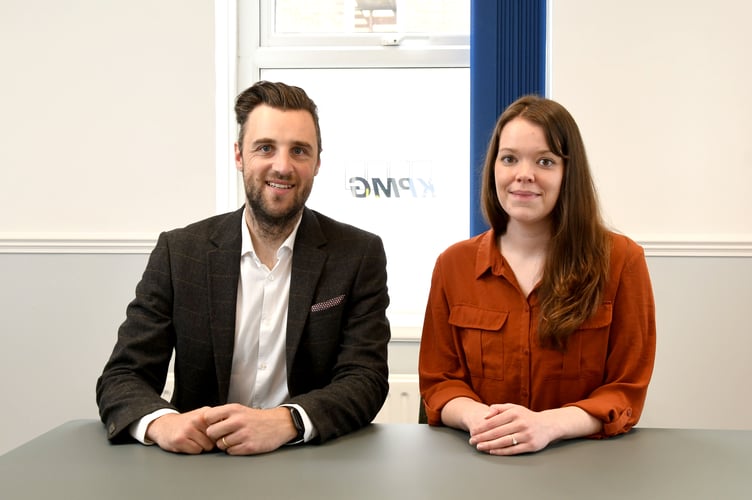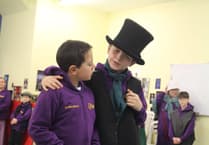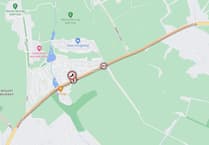A year ago KPMG in the Crown Dependencies launched its local IMPACT plan, focussing on the impact the business and its people have on their local communities.
KPMG is one of the largest employers across the islands of Jersey, Guernsey and the Isle of Man, with 145 employees in the Isle of Man office alone, and there has been great buy-in from its people who have enthusiastically embraced the idea of living more sustainably and volunteering their skills in the community.
The IMPACT plan is focused on four key areas: planet, people, prosperity and governance.
Prosperity is all about KPMG sharing its expertise: the firm’s new volunteering policy offers staff up to five days’ skilled volunteering allowance a year, to help them make a positive difference to their charitable organisation of choice.
Aimee Freegard is an audit manager at KPMG, looking after a portfolio of clients. As part of her role she is also performance manager to a number of the firm’s students, helping to oversee the training programme and interviewing new trainees and recruits.
Aimee has enthusiastically embraced the idea of a volunteering allowance as it gives her more time to help her favourite organisation, Girl Guides.
She says: ‘Volunteering is something that’s always been very close to my heart. I help run 1st Braddan Guide unit with a team of volunteers, so that’s my Monday evening pretty much planned out.
‘The girls start at age 10 and go on till they’re 14, then they can go on to a senior section. Within our unit, a lot of the girls stick around and want to become young leaders themselves because they’ve built that camaraderie.
‘It’s fantastic when you see the shy 10-year-old girl walk through the door that first week, who maybe doesn’t know the girls within the room and is quite reserved. Then, when you look back over the course of a year, it’s a different girl stood before you, a very confident, independent young woman. It’s a fantastic thing to be involved in, and incredibly rewarding.
As well as running activities for the girls within the unit, Aimee also plays a part in the management role of the unit: preparing the unit accounts, making payments, and making sure that the leaders are all up to date with the various qualifications and safeguarding training.

KPMG’s volunteering policy gives Aimee more time to spend on this:
‘There’s quite a lot of work that goes into that in the background and I think being able to work for an employer that really supports that, and values that as well, is fantastic.
‘This volunteering policy gives me more flexibility to do the background work and go on planned trips with the girls to camps away, as well as having the opportunity to do other volunteering activities,’ she says.
It has meant that Aimee has also been able sign up to participate in Junior Achievement, using the skills coaching young people that she has acquired in her working life and her Girl Guiding.
She says: ‘A key part of Junior Achievement is building up interview skills for the future and being able to help them to understand what, potentially, an interview is going to look like: what sort of questions you might get asked, how you should present yourself.
‘So I’m really looking forward to being able to take those skills that I’ve learned as an interviewer and being able to go out to the schools to talk with the students to say: “This is what you should be prepared for, this is what would make you stand out from the crowd”.’
Tim Shallcross is a senior markets manager at KPMG. It’s a role in which he primarily deals with clients and he says that they are definitely interested in the work the firm is doing on issues around community and environment.
He says: ‘I think what’s really interesting is that we try to demonstrate our own credentials first.
‘It’s having those conversations with clients, just to say: “we’ve been on this journey, we’re still on this journey, and we can help you on this journey as well – this is what we have done and what has worked well”.
‘I think the volunteering policy is brilliant: I don’t think many other firms would give five days to actually encourage staff to go out and get involved in charities and other things that, historically, you might have had to take a holiday for.
‘From a staff perspective that is brilliant and it’s also helping the community.’
Tim volunteers his skills at Hospice and he also uses the staff app which monitors ways in which they are reducing their carbon footprint. In Tim’s case this mostly takes the form of him cycling into work a couple of times a week, rather than driving.
Tim says: ‘There’s a leaderboard on the app and you see if your position changes – so there is that friendly competitiveness but it ultimately just shows the difference you can make when you do it.
‘It’s a prompt more than anything else: the app’s there to help facilitate that culture of personal change.’
Tim has long had a wish to live more sustainably and he recently fulfilled a personal dream of buying a small parcel of land near his home in Crosby and has started planting trees and vegetables there. The experience of Covid highlighted to Tim how much he appreciated the outdoors and open spaces.
He says: ‘I’ve always quite enjoyed my gardening: when we had our first house we had a little raised bed in the back garden.
‘Off the back of Covid we wanted to be a bit more sustainable: instead of going away and having the emissions of flights or boats, we wanted somewhere here where we can base ourselves and do a bit more, expand on gardening wider than one raised bed in my garden and just trying to create that biodiversity.’
It’s fair to say that the gardening has also been a learning curve, especially when Tim bought some hop plants which he was reliably informed would grow vigorously.
It was only after he had bought a trellis and put the plants in the ground that he discovered he had planted them upside down.
‘To be fair they do look the same either way up,’ Tim says.
Now, though, he is well on his way and this year he has planted peas, lettuce, spinach, broccoli, courgettes, onions and pumpkins.
And a lot of trees.
He received a grant from DEFA through their new Woodland Grant Scheme towards the cost of the trees - 230 in all - and the Woodland Trust carried out the planting as part of their corporate sponsorships. Tim donated his grant to the Woodland Trust to help with their valuable work.
He says: ‘They came last October and we planted shelter trees and then we’ve got a mini wood area of 100 trees and some hedging and another area of willow trees. It’s nice now to see the growth and the leaves coming on to the trees.
‘Separately we bought and planted a mini orchard so we’ve got three pear trees, four plums and nine apple trees and it’s nice to see them in blossom.’
Tim is already seeing the benefits to wildlife.
He says: ‘There’s a lane that you go down to the field and we’ve named that unofficially ‘Butterfly Alley’, because if you go there in the summer there’s so many butterflies and, even in the field, you’ll sit there in the evening and you might see six or seven bees flying around.’
He adds: ‘My son did a picture and it re-emphasised what we’re trying to teach him in real life. It was about saving the planet: “don’t cut down trees, don’t smoke, encourage the bees, etc”.
‘So it’s just nice that, even from a young age, it’s having that impact. If we don’t educate the younger people now then nothing’s going to change further down the line.’




